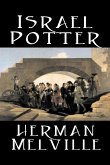Israel Potter: His Fifty Years of Exile is the eighth book by American writer Herman Melville, first published in serial form in Putnam's Monthly magazine between July 1854 and March 1855, and in book form by G. P. Putnam & Co. in March 1855. A pirated edition was also published in London by George Routledge in May 1855. The book is loosely based on a pamphlet (108-page) autobiography that Melville acquired in the 1840s, Life and Remarkable Adventures of Israel R. Potter (Providence, Rhode Island, 1824). Israel Potter (1744-1826) was a real person born in Cranston, Rhode Island. According to his own account, a memoir titled The Life and Remarkable Adventures of Israel R. Potter (published 1824), he had been a veteran of the Battle of Bunker Hill, a sailor in the Revolutionary navy, a prisoner of the British, an escapee in England, a secret agent and courier in France, and a 45-year exile from his native land as a laborer, pauper, and peddler in London. Melville's plot combines a number of Potter's actual encounters-King George III, Horne Tooke, and Benjamin Franklin-with some he never had-Ethan Allen and John Paul Jones. Melville's novel was adapted for the stage by Joe Bravaco and Larry Rosler as The Almost True and Truly Remarkable Adventures of Israel Potter. As few as six actors perform over fifty parts on a unit set - as such, the play easily lends itself to imaginative stagecraft and diverse and gender-bending casting. It is not a conventional period piece, but a show with a contemporary spin. It is suggested that actors dress in rehearsal clothes, using makeshift props and articles of clothing to evoke the period and characters. This highlights the physical and rollicking action of the play, as well as the deep, emotional current underneath its surface that speaks to our time. The play had its world premiere at the Winnipesaukee Playhouse in Meredith, New Hampshire in 2016. This was followed by productions at the Oldcastle Theatre Company in Bennington, Vermont in 2018 and Bluff City Theater in Hannibal, Missouri in 2019. An earlier workshop production was presented by the drama department at County College of Morris in Randolph, New Jersey. (wikipedia.org)
Hinweis: Dieser Artikel kann nur an eine deutsche Lieferadresse ausgeliefert werden.
Hinweis: Dieser Artikel kann nur an eine deutsche Lieferadresse ausgeliefert werden.









